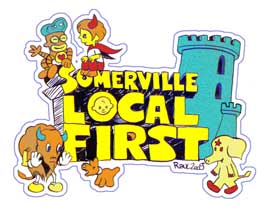Lauren C. Ostberg Whether it comes in the form of The Somerville Theater's window dressing, a "think global, act local" bumper sticker, or Whole Foods' latest sales' pitch, the term "local" has currency. Somerville Ward 6 Alderman Rebekah Gewirtz and Joe Grafton, Executive Director of Somerville Local First along with Cambridge Naturals proprietor Michael Kanter, were featured panelists at MIT's Sustainability Conference on Friday. During a breakout session, they discussed the "pro-local" culture of Cambridge and Somerville and answered audience questions about the movement. |
||||
"Somerville has a strong preference for local independent business," said Grafton, who founded Somerville Local First two years ago. The group now has more than 40 members, and its numbers are rising.
Some of this is Somerville culture – as Gewirtz noted, the city has long celebrated its distinctiveness – but it is also part of a broader trend.
"Going local cuts across all demographics," said Grafton. Despite variations in social class, national origin, or religious affiliation, human cultures tend to value entrepreneurship, sense of place, and identity, he said.
One audience member asked how Somerville's transient population – 65 percent are renters, many are students – fits into that sense of place, or the local economy.
"I think people come here for the local flavor," said Gewirtz, who is a renter herself. "Shopping local in Somerville means supporting something that is, by its nature, homey, unique."
Spending money locally cuts down on the cost of transportation, the use of preservatives, and the depersonalization of products; a dollar spent locally also represents a reinvestment in that community in the form of income tax.
Grafton came to the local movement seven years ago, after "a cataclysmic event when I almost died." He said that this near-death event inspired him to quit his lucrative corporate finance job and focus those skills on something he cared about – people.
Somerville Local First is, by design, a network of regional entrepreneurs, as opposed to nameless, faceless corporations – one of the requirements for membership is that a majority of the company's owners live within 25 miles of Somerville. Additionally, the business must be privately held, receive no assistance from an outside corporation, and have complete control over its own branding.
In terms of developing policies to make local businesses more competitive, Somerville Local First is "primarily a facilitator," Grafton said. He works to connect local entrepreneurs to local customer bases, and to use cause-based marketing to bring awareness to the subtler benefits of shopping local.
Local shoppers avoid making impulse buys, Grafton suggests. And, though locally-grown products are often more expensive, "if you consider them on a nutrient basis, they are more cost-effective," he said.
Gewirtz addressed the local government's ability to help small businesses compete. Somerville's Planning and Zoning Board, in particular, plays a decisive role in shaping the city's business landscape. She cited the Assembly Square development as evidence of poor decision-making on the part of the board, and on the aldermen who could have influenced it.
Gewirtz, whose proposed policies and initiatives often focus on the local economy, also spoke of the need to keep large, chain-store businesses from moving into Somerville, especially Davis Square.
"We've heard, over and over, that people don't want Davis Square to end up like Harvard Square," she said.
In Somerville, the Davis Square Task Force and ithe Davis Area Resident Business Initiative (DARBI) give community members the opportunity to question, review, and otherwise vet businesses that aspire to move into the area. The Task Force's activism, Gewirtz said, has prevented several large chains from moving into the neighborhood.
These groups also help identify the conflicts that inevitably arise in a city as dense and diverse as Somerville. According to Gewirtz, DARBI and the local government play a mediating role between business developers and their residential neighbors.
"Everyone wants the same thing," she said; in general, residents want a comfortable, but thriving, community. "The question is, how do you bring them together?"
In an April 8 meeting of the Board of Aldermen, Gewirtz asked the city's legal department to determine whether it would be possible to charge large businesses an extra fee for moving into the area. The money collected could then be applied to Somerville's Affordable Housing Trust Fund, a small-business start-up fund, or other local economic efforts. It is an idea that, if legal, penalizes large corporations as a matter of policy.
Gewirtz is unapologetic about her preference for independently-owned businesses. "I think the big boxes have every advantage, and what's at stake here is our community. So do I think it's fair to treat them differently? Absolutely," she said.
















Reader Comments